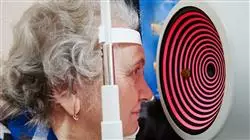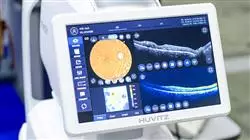University certificate
The world's largest faculty of medicine”
Introduction to the Program
Delve into the different Neuro-Ophthalmological Pathologies of the Central Nervous System and become a much more trained doctor"

This comprehensive academic program will train the physician for the correct approach and following the latest scientific evidence on the different Neuro-Ophthalmological Pathologies of the Central Nervous System, which in many cases are potentially dangerous to patient’s vision or even life.
To achieve the best academic results, the contents of this Postgraduate diploma have been prepared by ophthalmologists, neurologists and neurosurgeons, with the aim of enriching the student’s experience to the maximum. In this way, the professional will acquire diagnostic and therapeutic skills of the various Neuro-Ophthalmological pathologies known, including VOCID-19. In this way, you will be able to make a correct diagnostic approach by knowing the proper use of the most innovative technologies.
On the other hand, during the course of the program a thorough review will be carried out on the so-called Nystagmus, a term used to call sudden rapid and involuntary eye movements that can be from one side to the other, or from top to bottom (vertical nystagmus). Thus, after completing the Postgraduate diploma, the physician will be trained for the identification and treatment of Neuro-Ophthalmological pathologies with supranuclear origin.
One of the aspects that make this program unique is the treatment of the sequelae produced by COVID-19 at the Neuro-Ophthalmological level"
This Postgraduate diploma in Neuro-Ophthalmological Pathologies of the Central Nervous System contains the most complete and up-to-date educational program on the market. The most important features of the program include:
- Practical cases presented by experts in medicine
- The graphic, schematic, and practical contents with which they are created, provide scientific and practical information on the disciplines that are essential for professional practice
- Practical exercises where the self-assessment process can be carried out to improve learning
- Its special emphasis on innovative methodologies
- Theoretical lessons, questions to the expert, debate forums on controversial topics, and individual reflection assignments
- Content that is accessible from any fixed or portable device with an Internet connection
This program makes a complete review of the subspecialty of Neuro-Ophthalmology. Thus, the doctor will learn to treat and diagnose patients of all ages with this type of pathology"
The program’s teaching staff includes professionals from the sector who contribute their work experience to this training program, as well as renowned specialists from leading societies and prestigious universities.
The multimedia content, developed with the latest educational technology, will provide the professional with situated and contextual learning, i.e., a simulated environment that will provide immersive training programmed to train in real situations.
This program is designed around Problem-Based Learning, whereby the professional must try to solve the different professional practice situations that arise during the academic year. For this purpose, the student will be assisted by an innovative interactive video system created by renowned and experienced experts.
TECH proven teaching methodology will help you reach the top of your profession. Do not hesitate and come to study at this great university"

This Postgraduate diploma is unique for offering the student advanced knowledge in the Neuro-Ophthalmological impact of the new disease COVID-19"
Why study at TECH?
TECH is the world’s largest online university. With an impressive catalog of more than 14,000 university programs available in 11 languages, it is positioned as a leader in employability, with a 99% job placement rate. In addition, it relies on an enormous faculty of more than 6,000 professors of the highest international renown.

Study at the world's largest online university and guarantee your professional success. The future starts at TECH”
The world’s best online university according to FORBES
The prestigious Forbes magazine, specialized in business and finance, has highlighted TECH as “the world's best online university” This is what they have recently stated in an article in their digital edition in which they echo the success story of this institution, “thanks to the academic offer it provides, the selection of its teaching staff, and an innovative learning method aimed at educating the professionals of the future”
A revolutionary study method, a cutting-edge faculty and a practical focus: the key to TECH's success.
The most complete study plans on the university scene
TECH offers the most complete study plans on the university scene, with syllabuses that cover fundamental concepts and, at the same time, the main scientific advances in their specific scientific areas. In addition, these programs are continuously being updated to guarantee students the academic vanguard and the most in-demand professional skills. In this way, the university's qualifications provide its graduates with a significant advantage to propel their careers to success.
TECH offers the most comprehensive and intensive study plans on the current university scene.
A world-class teaching staff
TECH's teaching staff is made up of more than 6,000 professors with the highest international recognition. Professors, researchers and top executives of multinational companies, including Isaiah Covington, performance coach of the Boston Celtics; Magda Romanska, principal investigator at Harvard MetaLAB; Ignacio Wistumba, chairman of the department of translational molecular pathology at MD Anderson Cancer Center; and D.W. Pine, creative director of TIME magazine, among others.
Internationally renowned experts, specialized in different branches of Health, Technology, Communication and Business, form part of the TECH faculty.
A unique learning method
TECH is the first university to use Relearning in all its programs. It is the best online learning methodology, accredited with international teaching quality certifications, provided by prestigious educational agencies. In addition, this disruptive educational model is complemented with the “Case Method”, thereby setting up a unique online teaching strategy. Innovative teaching resources are also implemented, including detailed videos, infographics and interactive summaries.
TECH combines Relearning and the Case Method in all its university programs to guarantee excellent theoretical and practical learning, studying whenever and wherever you want.
The world's largest online university
TECH is the world’s largest online university. We are the largest educational institution, with the best and widest online educational catalog, one hundred percent online and covering the vast majority of areas of knowledge. We offer a large selection of our own degrees and accredited online undergraduate and postgraduate degrees. In total, more than 14,000 university degrees, in eleven different languages, make us the largest educational largest in the world.
TECH has the world's most extensive catalog of academic and official programs, available in more than 11 languages.
Google Premier Partner
The American technology giant has awarded TECH the Google Google Premier Partner badge. This award, which is only available to 3% of the world's companies, highlights the efficient, flexible and tailored experience that this university provides to students. The recognition as a Google Premier Partner not only accredits the maximum rigor, performance and investment in TECH's digital infrastructures, but also places this university as one of the world's leading technology companies.
Google has positioned TECH in the top 3% of the world's most important technology companies by awarding it its Google Premier Partner badge.
The official online university of the NBA
TECH is the official online university of the NBA. Thanks to our agreement with the biggest league in basketball, we offer our students exclusive university programs, as well as a wide variety of educational resources focused on the business of the league and other areas of the sports industry. Each program is made up of a uniquely designed syllabus and features exceptional guest hosts: professionals with a distinguished sports background who will offer their expertise on the most relevant topics.
TECH has been selected by the NBA, the world's top basketball league, as its official online university.
The top-rated university by its students
Students have positioned TECH as the world's top-rated university on the main review websites, with a highest rating of 4.9 out of 5, obtained from more than 1,000 reviews. These results consolidate TECH as the benchmark university institution at an international level, reflecting the excellence and positive impact of its educational model.” reflecting the excellence and positive impact of its educational model.”
TECH is the world’s top-rated university by its students.
Leaders in employability
TECH has managed to become the leading university in employability. 99% of its students obtain jobs in the academic field they have studied, within one year of completing any of the university's programs. A similar number achieve immediate career enhancement. All this thanks to a study methodology that bases its effectiveness on the acquisition of practical skills, which are absolutely necessary for professional development.
99% of TECH graduates find a job within a year of completing their studies.
Postgraduate Diploma in Neuro-ophthalmological Pathologies of the Central Nervous System
During this Postgraduate Diploma in Neuro-ophthalmological Pathologies of the Central Nervous System at TECH, the doctor will be able to delve into the different supranuclear pathologies that can affect ocular motility, including nystagmus, and some neurological syndromes with ophthalmological repercussions. It will also address, on the one hand, the neuro-ophthalmological manifestations of the recent disease COVID-19 and, on the other, the detailed study of headaches with ophthalmological repercussions. This in-depth review of neuro-ophthalmological diseases of the central nervous system will allow the student a notable improvement in their approach and in the treatment of patients. The central nervous system and the visual system are closely related, and any pathology that affects the brain or spinal cord can have an impact on ocular function. Therefore, it is essential to train in an area of specialization that unites both disciplines. This postgraduate academic program, designed by Postgraduate Diplomas in Medicine, Ophthalmology and Neurology, offers health professionals the opportunity to deepen their knowledge of pathologies that affect both the central nervous system and vision. It is a highly specialized preparation that trains students in the diagnosis, treatment and prevention of these complex conditions.
Study online from anywhere in the world
During the Postgraduate Diploma, topics such as the study of vision disorders caused by neurological diseases, focal visual deficiencies caused by damage to the basal ganglia or the repercussions of pathologies such as multiple sclerosis, Parkinson's or accident will be addressed. cerebrovascular in the visual system. At TECH Global University we have a virtual library, multimedia content, and a specialized faculty so that all students achieve their goals.







